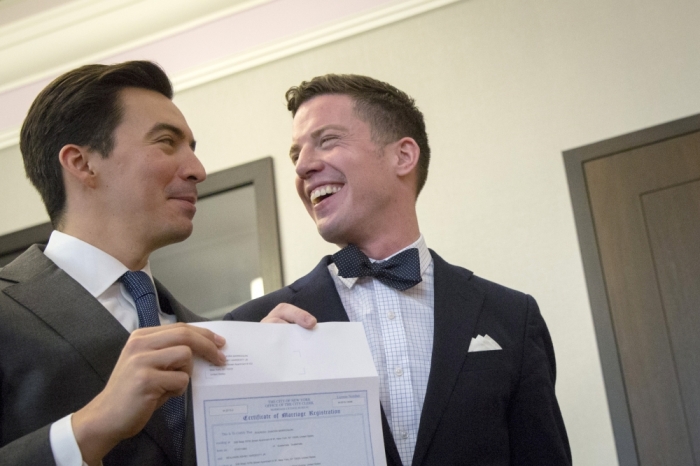Two Men May Be Able to Make a Baby, No Need for Woman's Egg, Scientists Say

In defiance of nature and centuries of accepted wisdom, scientists from a leading university in the United Kingdom unveiled new research on Tuesday suggesting that in the distant future two men could come together to make a baby and eliminate the need for eggs from women.
Department of Biology & Biochemistry scientists at the University of Bath announced that they have developed a method of injecting mouse parthenogenotes with sperm that allows them to become healthy baby mice with a success rate of up to 24 percent.
The researchers from the University of Bath say the discovery challenges two centuries of accepted wisdom that egg cells are required for the creation of offspring.
"This is first time that full term development has been achieved by injecting sperm into embryos," molecular embryologist Dr. Tony Perry, senior author of the study published in the journal Nature Communications, said.
"It had been thought that only an egg cell was capable of reprogramming sperm to allow embryonic development to take place.
"Our work challenges the dogma, held since early embryologists first observed mammalian eggs around 1827 and observed fertilization 50 years later, that only an egg cell fertilized with a sperm cell can result in a live mammalian birth," Perry said.
The university said the research idea came from Dr. Toru Suzuki in Perry's team in the University of Bath's Laboratory of Mammalian Molecular Embryology, who performed the study together with team member Dr. Maki Asami and colleagues from the University of Regensburg and the Fraunhofer Institute for Toxicology and Experimental Medicine in Germany.
"The baby mice born as a result of the technique seem completely healthy, but their DNA started out with different epigenetic marks compared with normal fertilization. This suggests that different epigenetic pathways can lead to the same developmental destination, something not previously shown," said the University of Bath.
In an interview with the BBC, Perry said removing the need for an egg could have a wider impact on society.
"One possibility, in the distant future, is that it might be possible that ordinary cells in the body can be combined with a sperm so that an embryo is formed," Perry said.
This means two men could have a child, with one donating an ordinary cell and the other, sperm. A man could theoretically also have his own child using his own cells and sperm and that child would end up being more like a non-identical twin than a clone.
Perry warned, however, that these possibilities are still "speculative and fanciful."
Professor Robin Lovell-Badge of the Francis Crick Institute, told the BBC: "I'm not surprised that the authors are excited about this.
"I think it is a very interesting paper, and a technical tour de force and I am sure it will tell us something important about reprogramming at these early steps of development that are relevant to both fertilization and single cell nuclear transfer [cloning]," he said.
"And, perhaps more broadly, about reprogramming of cell fate in other situations. It doesn't yet tell us how, but the paper gives a number of clear pointers," Badge added.
The University of Bath further noted that their discovery has ethical implications as well.
"The discovery has ethical implications for recent suggestions that human parthenogenotes could be used as a source of embryonic stem cells because they were considered inviable. It also hints that in the long-term future it could be possible to breed animals using non-egg cells and sperm. Although this is still only an idea, it could have potential future applications in human fertility treatment and for breeding endangered species," the university said.
Eggs can be "tricked" into developing into an embryo without fertilization, but the resulting embryos, called parthenogenotes, die after a few days because key developmental processes requiring input from sperm don't happen, explained the University of Bath.





























